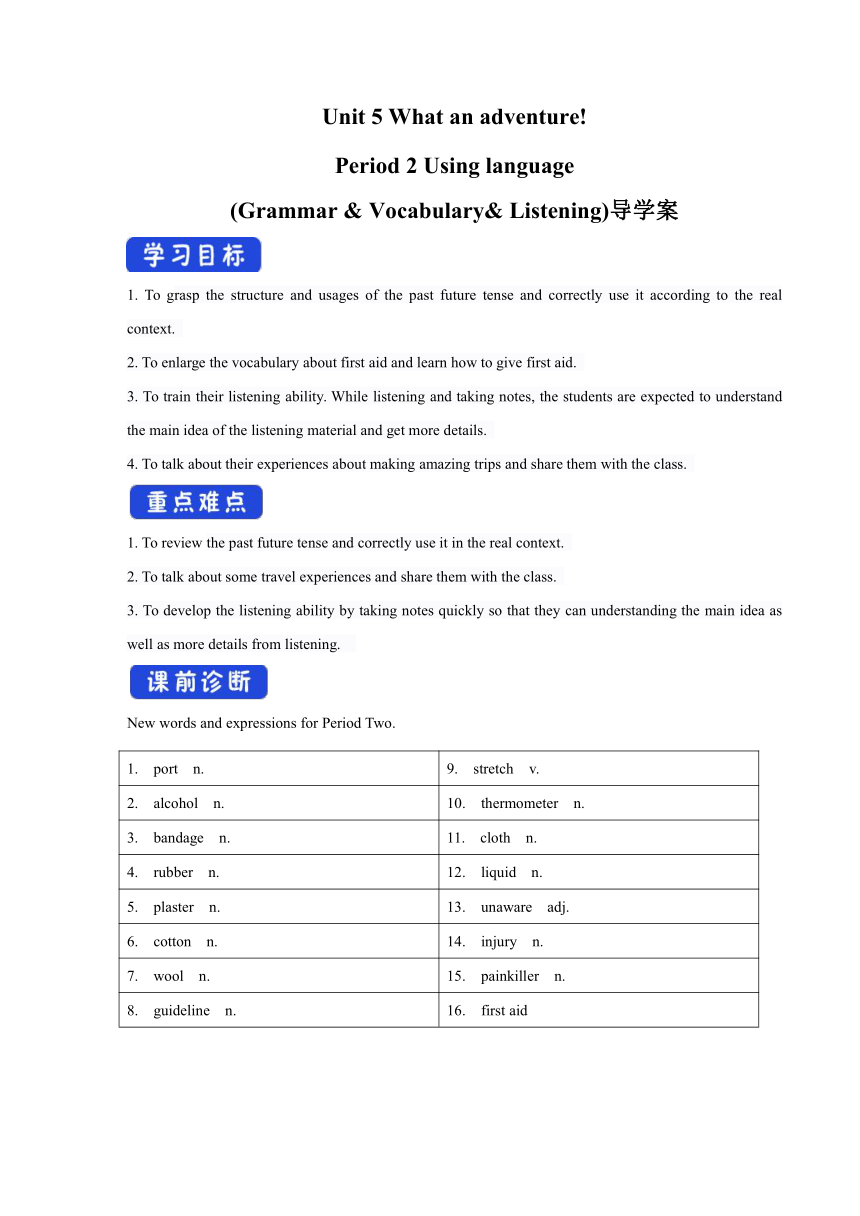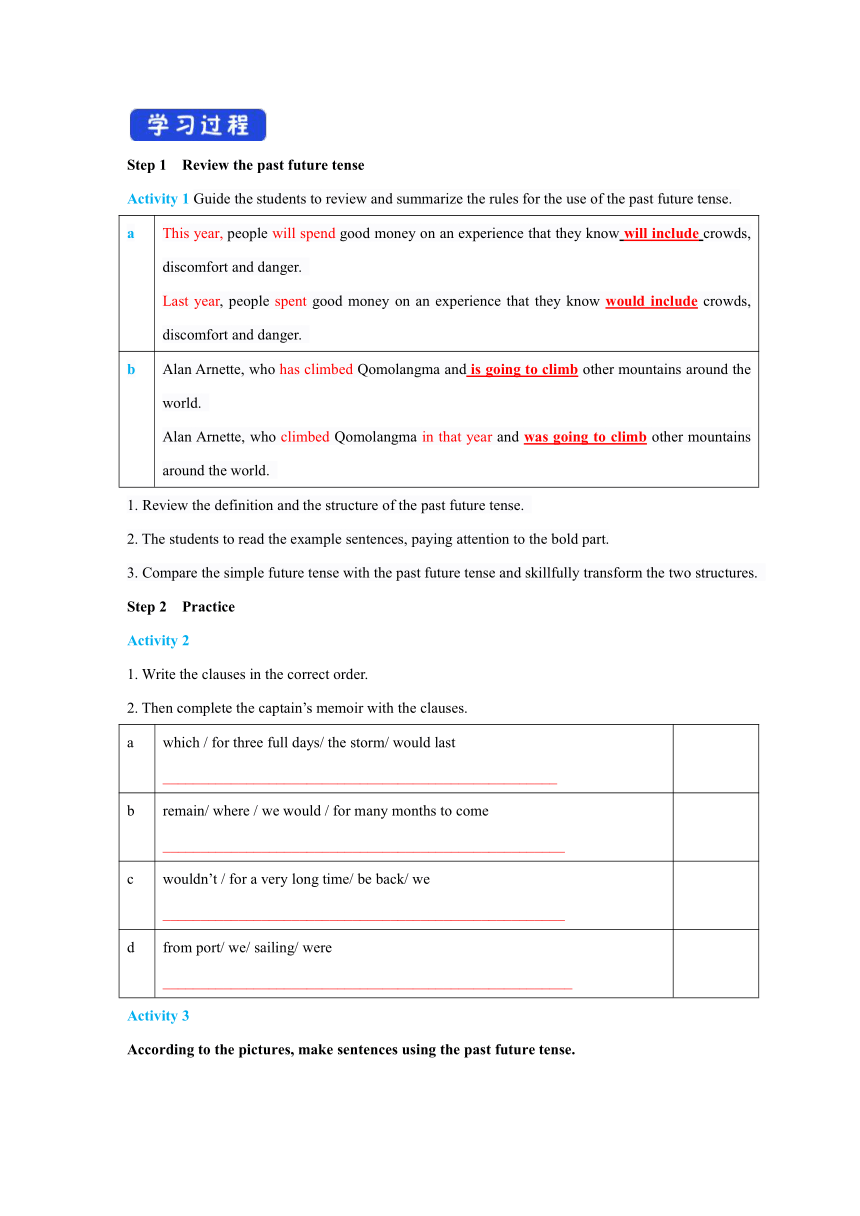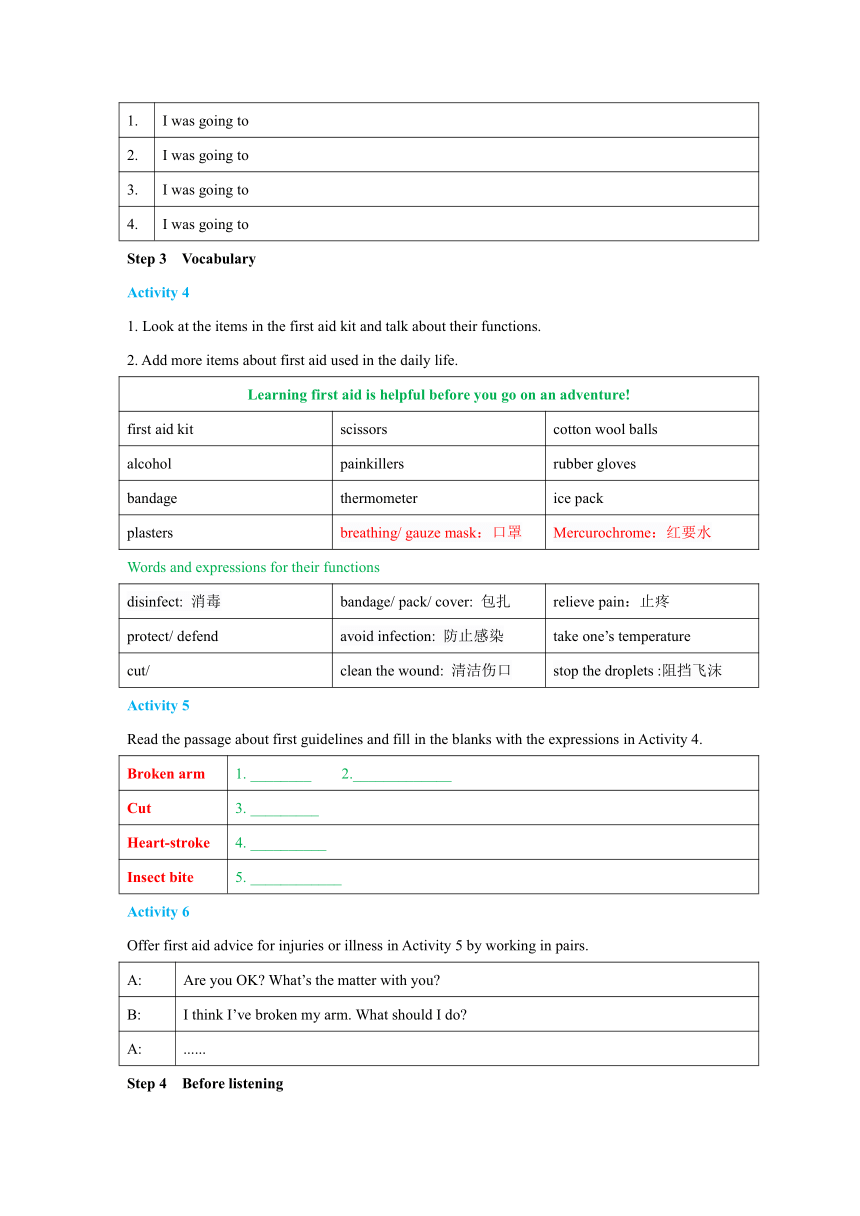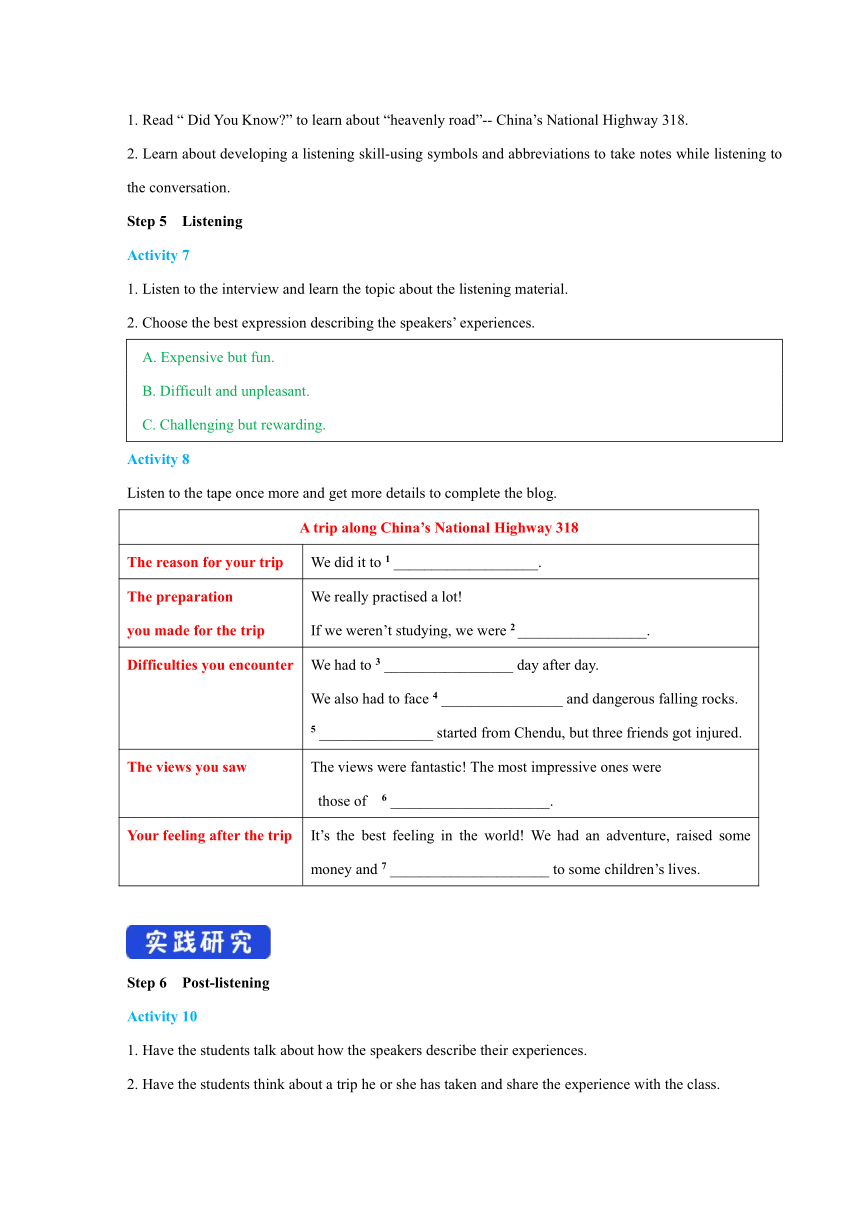外研版(2019) 必修第三册 Unit 5 What an adventure!Using languages 导学案(1)Word版含答案
文档属性
| 名称 | 外研版(2019) 必修第三册 Unit 5 What an adventure!Using languages 导学案(1)Word版含答案 |  | |
| 格式 | zip | ||
| 文件大小 | 59.3KB | ||
| 资源类型 | 教案 | ||
| 版本资源 | 外研版(2019) | ||
| 科目 | 英语 | ||
| 更新时间 | 2022-08-25 14:38:12 | ||
图片预览




文档简介
Unit 5 What an adventure!
Period 2 Using language
(Grammar & Vocabulary& Listening)导学案
1. To grasp the structure and usages of the past future tense and correctly use it according to the real context.
2. To enlarge the vocabulary about first aid and learn how to give first aid.
3. To train their listening ability. While listening and taking notes, the students are expected to understand the main idea of the listening material and get more details.
4. To talk about their experiences about making amazing trips and share them with the class.
1. To review the past future tense and correctly use it in the real context.
2. To talk about some travel experiences and share them with the class.
3. To develop the listening ability by taking notes quickly so that they can understanding the main idea as well as more details from listening.
New words and expressions for Period Two.
1. port n. 9. stretch v.
2. alcohol n. 10. thermometer n.
3. bandage n. 11. cloth n.
4. rubber n. 12. liquid n.
5. plaster n. 13. unaware adj.
6. cotton n. 14. injury n.
7. wool n. 15. painkiller n.
8. guideline n. 16. first aid
Step 1 Review the past future tense
Activity 1 Guide the students to review and summarize the rules for the use of the past future tense.
a This year, people will spend good money on an experience that they know will include crowds, discomfort and danger. Last year, people spent good money on an experience that they know would include crowds, discomfort and danger.
b Alan Arnette, who has climbed Qomolangma and is going to climb other mountains around the world. Alan Arnette, who climbed Qomolangma in that year and was going to climb other mountains around the world.
1. Review the definition and the structure of the past future tense.
2. The students to read the example sentences, paying attention to the bold part.
3. Compare the simple future tense with the past future tense and skillfully transform the two structures.
Step 2 Practice
Activity 2
1. Write the clauses in the correct order.
2. Then complete the captain’s memoir with the clauses.
a which / for three full days/ the storm/ would last ____________________________________________________
b remain/ where / we would / for many months to come _____________________________________________________
c wouldn’t / for a very long time/ be back/ we _____________________________________________________
d from port/ we/ sailing/ were ______________________________________________________
Activity 3
According to the pictures, make sentences using the past future tense.
1. I was going to
2. I was going to
3. I was going to
4. I was going to
Step 3 Vocabulary
Activity 4
1. Look at the items in the first aid kit and talk about their functions.
2. Add more items about first aid used in the daily life.
Learning first aid is helpful before you go on an adventure!
first aid kit scissors cotton wool balls
alcohol painkillers rubber gloves
bandage thermometer ice pack
plasters breathing/ gauze mask:口罩 Mercurochrome:红要水
Words and expressions for their functions
disinfect: 消毒 bandage/ pack/ cover: 包扎 relieve pain:止疼
protect/ defend avoid infection: 防止感染 take one’s temperature
cut/ clean the wound: 清洁伤口 stop the droplets :阻挡飞沫
Activity 5
Read the passage about first guidelines and fill in the blanks with the expressions in Activity 4.
Broken arm 1. ________ 2._____________
Cut 3. _________
Heart-stroke 4. __________
Insect bite 5. ____________
Activity 6
Offer first aid advice for injuries or illness in Activity 5 by working in pairs.
A: Are you OK What’s the matter with you
B: I think I’ve broken my arm. What should I do
A: ......
Step 4 Before listening
1. Read “ Did You Know ” to learn about “heavenly road”-- China’s National Highway 318.
2. Learn about developing a listening skill-using symbols and abbreviations to take notes while listening to the conversation.
Step 5 Listening
Activity 7
1. Listen to the interview and learn the topic about the listening material.
2. Choose the best expression describing the speakers’ experiences.
A. Expensive but fun.
B. Difficult and unpleasant.
C. Challenging but rewarding.
Activity 8
Listen to the tape once more and get more details to complete the blog.
A trip along China’s National Highway 318
The reason for your trip We did it to 1 ___________________.
The preparation you made for the trip We really practised a lot! If we weren’t studying, we were 2 _________________.
Difficulties you encounter We had to 3 _________________ day after day. We also had to face 4 ________________ and dangerous falling rocks. 5 _______________ started from Chendu, but three friends got injured.
The views you saw The views were fantastic! The most impressive ones were those of 6 _____________________.
Your feeling after the trip It’s the best feeling in the world! We had an adventure, raised some money and 7 _____________________ to some children’s lives.
Step 6 Post-listening
Activity 10
1. Have the students talk about how the speakers describe their experiences.
2. Have the students think about a trip he or she has taken and share the experience with the class.
Step 6 Language appreciation
1. Once the wound is cleaned and dry, cover it with a bandage.
[句式分析] “once”意为 “_________”, 引导“_________从句”,主句 “cover it with a bandage”为____________(句式)。
[尝试翻译] ________________________________。
2. Next time you need to takes, try using some of these.
[句式分析] “next time”在句中充当连词,意为“___________”,引导“__________从句”。类似比较特殊的连词还有 the moment, the minute, the second, the instant“immediately,instantly,directly,意为 一...就”; 表示“上次”、“下次”、“每次”等的时间连词。主要的有every time(每次),each time(每次),(the) next time(下次),any time(随时),(the) last time(上次),the first time(第一次)。
[尝试翻译] ___________________________________________。
Step 7: Homework
1. Review key words and expressions learned in this period.
2. Consolidate the usages of the past future tense.
【参考答案】
Step 1 Review the past future tense
Activity 1 Guide the students to review and summarize the rules for the use of the past future tense.
a This year, people will spend good money on an experience that they know will include crowds, discomfort and danger. Last year, people spent good money on an experience that they know would include crowds, discomfort and danger.
b Alan Arnette, who has climbed Qomolangma and is going to climb other mountains around the world. Alan Arnette, who climbed Qomolangma in that year and was going to climb other mountains around the world.
1. Review the definition and the structure of the past future tense.
2. The students to read the example sentences, paying attention to the bold part.
3. Compare the simple future tense with the past future tense and skillfully transform the two structures.
Step 2 Practice
Activity 2
1. Write the clauses in the correct order.
2. Then complete the captain’s memoir with the clauses.
【答案】
a which / for three full days/ the storm/ would last the storm which would last for three days. 3
b remain/ where / we would / for many months to come where we would remain for many months to come. 4
c wouldn’t / for a very long time/ be back/ we we wouldn’t be back for a very long time. 2
d from port/ we/ sailing/ were we were sailing from port. 1
Activity 3
According to the pictures, make sentences using the past future tense.
【答案】
1. I was going to hunt for some food,but I failed to find something to eat.
2. I was going to collect some water, but there was no container for water.
3. I was going to put up the tent, but one of tent poles was broken.
4. I was going to build a fire, but it was raining heavily on the island.
Step 3 Vocabulary
Activity 4
1. Look at the items in the first aid kit and talk about their functions.
2. Add more items about first aid used in the daily life.
Learning first aid is helpful before you go on an adventure!
first aid kit scissors cotton wool balls
alcohol painkillers rubber gloves
bandage thermometer ice pack
plasters breathing/ gauze mask:口罩 Mercurochrome:红要水
Words and expressions for their functions
disinfect: 消毒 bandage/ pack/ cover: 包扎 relieve pain:止疼
protect/ defend avoid infection: 防止感染 take one’s temperature
cut/ clean the wound: 清洁伤口 stop the droplets :阻挡飞沫
Activity 5
Read the passage about first guidelines and fill in the blanks with the expressions in Activity 4.
【答案】
Broken arm 1. ice pack; 2. bandage
Cut 3. alcohol;
Heart-stroke 4. thermometer;
Insect bite 5. painkillers
Activity 6
Offer first aid advice for injuries or illness in Activity 5 by working in pairs.
【答案】
A: Are you OK What’s the matter with you
B: I think I’ve broken my arm. What should I do
A: It is very important for you to keep the arm still before making a sling out of a bandage. To relieve pain, put an ice pack on the arm. If it is too cold, cover it with cloth beforehand.
Step 4 Before listening
1. Read “ Did You Know ” to learn about “heavenly road”-- China’s National Highway 318.
2. Learn about developing a listening skill-using symbols and abbreviations to take notes while listening to the conversation.
Step 5 Listening
Activity 7
1. Listen to the interview and learn the topic about the listening material.
2. Choose the best expression describing the speakers’ experiences.
A. Expensive but fun.
B. Difficult and unpleasant.
C. Challenging but rewarding.
Activity 8
Listen to the tape once more and get more details to complete the blog.
A trip along China’s National Highway 318
The reason for your trip We did it to 1 ___________________.
The preparation you made for the trip We really practised a lot! If we weren’t studying, we were 2 _________________.
Difficulties you encounter We had to 3 _________________ day after day. We also had to face 4 ________________ and dangerous falling rocks. 5 _______________ started from Chendu, but three friends got injured.
The views you saw The views were fantastic! The most impressive ones were those of 6 _____________________.
Your feeling after the trip It’s the best feeling in the world! We had an adventure, raised some money and 7 _____________________ to some children’s lives.
Step 6 Post-listening
Activity 10
1. Have the students talk about how the speakers describe their experiences.
2. Have the students think about a trip he or she has taken and share the experience with the class.
【答案】
After several hours’ trip along the mountain, we realized that it’s time for us to return home. Excited and attached to amazing views of the trip, I started my sports bike. My brother’s bike, moving downhill fast, got far ahead of me.With it went my last bit of courage. On one side of my car the mountain rose like a high wall of sheer rock. On the other side was thin air. I struggled desperately not to look over the outside of the mountain. As the old saying goes, it is easier to walk downhill than uphill.
Halfway down the hill, my bike broke down. I had to wait for my elder brother to return for help. He was an expert in field trips. It didn't take him long to fix my sports bike. Next, I followed him and tried to pedal the bike to our destination, tried but sound safe.
Step 6 Language appreciation
【答案】
1. Once the wound is cleaned and dry, cover it with a bandage.
[句式分析] “once”意为 “一旦....就...”, 引导“条件状语从句”,主句 “cover it with a bandage”为祈使句。
[尝试翻译] 一旦伤口清洁并干燥,用绷带包扎。
2. Next time you need to takes, try using some of these.
[句式分析] “next time”在句中充当连词,意为“当下次...的时候”,引导“时间状语从句”。类似比较特殊的连词还有 the moment, the minute, the second, the instant“immediately,instantly,directly,意为 一...就”; 表示“上次”、“下次”、“每次”等的时间连词。主要的有every time(每次),each time(每次),(the) next time(下次),any time(随时),(the) last time(上次),the first time(第一次)。
[尝试翻译] 下次你需要记笔记时,试着使用其中的一些。
Step 7: Homework
1. Review key words and expressions learned in this period.
2. Consolidate the usages of the past future tense.
Period 2 Using language
(Grammar & Vocabulary& Listening)导学案
1. To grasp the structure and usages of the past future tense and correctly use it according to the real context.
2. To enlarge the vocabulary about first aid and learn how to give first aid.
3. To train their listening ability. While listening and taking notes, the students are expected to understand the main idea of the listening material and get more details.
4. To talk about their experiences about making amazing trips and share them with the class.
1. To review the past future tense and correctly use it in the real context.
2. To talk about some travel experiences and share them with the class.
3. To develop the listening ability by taking notes quickly so that they can understanding the main idea as well as more details from listening.
New words and expressions for Period Two.
1. port n. 9. stretch v.
2. alcohol n. 10. thermometer n.
3. bandage n. 11. cloth n.
4. rubber n. 12. liquid n.
5. plaster n. 13. unaware adj.
6. cotton n. 14. injury n.
7. wool n. 15. painkiller n.
8. guideline n. 16. first aid
Step 1 Review the past future tense
Activity 1 Guide the students to review and summarize the rules for the use of the past future tense.
a This year, people will spend good money on an experience that they know will include crowds, discomfort and danger. Last year, people spent good money on an experience that they know would include crowds, discomfort and danger.
b Alan Arnette, who has climbed Qomolangma and is going to climb other mountains around the world. Alan Arnette, who climbed Qomolangma in that year and was going to climb other mountains around the world.
1. Review the definition and the structure of the past future tense.
2. The students to read the example sentences, paying attention to the bold part.
3. Compare the simple future tense with the past future tense and skillfully transform the two structures.
Step 2 Practice
Activity 2
1. Write the clauses in the correct order.
2. Then complete the captain’s memoir with the clauses.
a which / for three full days/ the storm/ would last ____________________________________________________
b remain/ where / we would / for many months to come _____________________________________________________
c wouldn’t / for a very long time/ be back/ we _____________________________________________________
d from port/ we/ sailing/ were ______________________________________________________
Activity 3
According to the pictures, make sentences using the past future tense.
1. I was going to
2. I was going to
3. I was going to
4. I was going to
Step 3 Vocabulary
Activity 4
1. Look at the items in the first aid kit and talk about their functions.
2. Add more items about first aid used in the daily life.
Learning first aid is helpful before you go on an adventure!
first aid kit scissors cotton wool balls
alcohol painkillers rubber gloves
bandage thermometer ice pack
plasters breathing/ gauze mask:口罩 Mercurochrome:红要水
Words and expressions for their functions
disinfect: 消毒 bandage/ pack/ cover: 包扎 relieve pain:止疼
protect/ defend avoid infection: 防止感染 take one’s temperature
cut/ clean the wound: 清洁伤口 stop the droplets :阻挡飞沫
Activity 5
Read the passage about first guidelines and fill in the blanks with the expressions in Activity 4.
Broken arm 1. ________ 2._____________
Cut 3. _________
Heart-stroke 4. __________
Insect bite 5. ____________
Activity 6
Offer first aid advice for injuries or illness in Activity 5 by working in pairs.
A: Are you OK What’s the matter with you
B: I think I’ve broken my arm. What should I do
A: ......
Step 4 Before listening
1. Read “ Did You Know ” to learn about “heavenly road”-- China’s National Highway 318.
2. Learn about developing a listening skill-using symbols and abbreviations to take notes while listening to the conversation.
Step 5 Listening
Activity 7
1. Listen to the interview and learn the topic about the listening material.
2. Choose the best expression describing the speakers’ experiences.
A. Expensive but fun.
B. Difficult and unpleasant.
C. Challenging but rewarding.
Activity 8
Listen to the tape once more and get more details to complete the blog.
A trip along China’s National Highway 318
The reason for your trip We did it to 1 ___________________.
The preparation you made for the trip We really practised a lot! If we weren’t studying, we were 2 _________________.
Difficulties you encounter We had to 3 _________________ day after day. We also had to face 4 ________________ and dangerous falling rocks. 5 _______________ started from Chendu, but three friends got injured.
The views you saw The views were fantastic! The most impressive ones were those of 6 _____________________.
Your feeling after the trip It’s the best feeling in the world! We had an adventure, raised some money and 7 _____________________ to some children’s lives.
Step 6 Post-listening
Activity 10
1. Have the students talk about how the speakers describe their experiences.
2. Have the students think about a trip he or she has taken and share the experience with the class.
Step 6 Language appreciation
1. Once the wound is cleaned and dry, cover it with a bandage.
[句式分析] “once”意为 “_________”, 引导“_________从句”,主句 “cover it with a bandage”为____________(句式)。
[尝试翻译] ________________________________。
2. Next time you need to takes, try using some of these.
[句式分析] “next time”在句中充当连词,意为“___________”,引导“__________从句”。类似比较特殊的连词还有 the moment, the minute, the second, the instant“immediately,instantly,directly,意为 一...就”; 表示“上次”、“下次”、“每次”等的时间连词。主要的有every time(每次),each time(每次),(the) next time(下次),any time(随时),(the) last time(上次),the first time(第一次)。
[尝试翻译] ___________________________________________。
Step 7: Homework
1. Review key words and expressions learned in this period.
2. Consolidate the usages of the past future tense.
【参考答案】
Step 1 Review the past future tense
Activity 1 Guide the students to review and summarize the rules for the use of the past future tense.
a This year, people will spend good money on an experience that they know will include crowds, discomfort and danger. Last year, people spent good money on an experience that they know would include crowds, discomfort and danger.
b Alan Arnette, who has climbed Qomolangma and is going to climb other mountains around the world. Alan Arnette, who climbed Qomolangma in that year and was going to climb other mountains around the world.
1. Review the definition and the structure of the past future tense.
2. The students to read the example sentences, paying attention to the bold part.
3. Compare the simple future tense with the past future tense and skillfully transform the two structures.
Step 2 Practice
Activity 2
1. Write the clauses in the correct order.
2. Then complete the captain’s memoir with the clauses.
【答案】
a which / for three full days/ the storm/ would last the storm which would last for three days. 3
b remain/ where / we would / for many months to come where we would remain for many months to come. 4
c wouldn’t / for a very long time/ be back/ we we wouldn’t be back for a very long time. 2
d from port/ we/ sailing/ were we were sailing from port. 1
Activity 3
According to the pictures, make sentences using the past future tense.
【答案】
1. I was going to hunt for some food,but I failed to find something to eat.
2. I was going to collect some water, but there was no container for water.
3. I was going to put up the tent, but one of tent poles was broken.
4. I was going to build a fire, but it was raining heavily on the island.
Step 3 Vocabulary
Activity 4
1. Look at the items in the first aid kit and talk about their functions.
2. Add more items about first aid used in the daily life.
Learning first aid is helpful before you go on an adventure!
first aid kit scissors cotton wool balls
alcohol painkillers rubber gloves
bandage thermometer ice pack
plasters breathing/ gauze mask:口罩 Mercurochrome:红要水
Words and expressions for their functions
disinfect: 消毒 bandage/ pack/ cover: 包扎 relieve pain:止疼
protect/ defend avoid infection: 防止感染 take one’s temperature
cut/ clean the wound: 清洁伤口 stop the droplets :阻挡飞沫
Activity 5
Read the passage about first guidelines and fill in the blanks with the expressions in Activity 4.
【答案】
Broken arm 1. ice pack; 2. bandage
Cut 3. alcohol;
Heart-stroke 4. thermometer;
Insect bite 5. painkillers
Activity 6
Offer first aid advice for injuries or illness in Activity 5 by working in pairs.
【答案】
A: Are you OK What’s the matter with you
B: I think I’ve broken my arm. What should I do
A: It is very important for you to keep the arm still before making a sling out of a bandage. To relieve pain, put an ice pack on the arm. If it is too cold, cover it with cloth beforehand.
Step 4 Before listening
1. Read “ Did You Know ” to learn about “heavenly road”-- China’s National Highway 318.
2. Learn about developing a listening skill-using symbols and abbreviations to take notes while listening to the conversation.
Step 5 Listening
Activity 7
1. Listen to the interview and learn the topic about the listening material.
2. Choose the best expression describing the speakers’ experiences.
A. Expensive but fun.
B. Difficult and unpleasant.
C. Challenging but rewarding.
Activity 8
Listen to the tape once more and get more details to complete the blog.
A trip along China’s National Highway 318
The reason for your trip We did it to 1 ___________________.
The preparation you made for the trip We really practised a lot! If we weren’t studying, we were 2 _________________.
Difficulties you encounter We had to 3 _________________ day after day. We also had to face 4 ________________ and dangerous falling rocks. 5 _______________ started from Chendu, but three friends got injured.
The views you saw The views were fantastic! The most impressive ones were those of 6 _____________________.
Your feeling after the trip It’s the best feeling in the world! We had an adventure, raised some money and 7 _____________________ to some children’s lives.
Step 6 Post-listening
Activity 10
1. Have the students talk about how the speakers describe their experiences.
2. Have the students think about a trip he or she has taken and share the experience with the class.
【答案】
After several hours’ trip along the mountain, we realized that it’s time for us to return home. Excited and attached to amazing views of the trip, I started my sports bike. My brother’s bike, moving downhill fast, got far ahead of me.With it went my last bit of courage. On one side of my car the mountain rose like a high wall of sheer rock. On the other side was thin air. I struggled desperately not to look over the outside of the mountain. As the old saying goes, it is easier to walk downhill than uphill.
Halfway down the hill, my bike broke down. I had to wait for my elder brother to return for help. He was an expert in field trips. It didn't take him long to fix my sports bike. Next, I followed him and tried to pedal the bike to our destination, tried but sound safe.
Step 6 Language appreciation
【答案】
1. Once the wound is cleaned and dry, cover it with a bandage.
[句式分析] “once”意为 “一旦....就...”, 引导“条件状语从句”,主句 “cover it with a bandage”为祈使句。
[尝试翻译] 一旦伤口清洁并干燥,用绷带包扎。
2. Next time you need to takes, try using some of these.
[句式分析] “next time”在句中充当连词,意为“当下次...的时候”,引导“时间状语从句”。类似比较特殊的连词还有 the moment, the minute, the second, the instant“immediately,instantly,directly,意为 一...就”; 表示“上次”、“下次”、“每次”等的时间连词。主要的有every time(每次),each time(每次),(the) next time(下次),any time(随时),(the) last time(上次),the first time(第一次)。
[尝试翻译] 下次你需要记笔记时,试着使用其中的一些。
Step 7: Homework
1. Review key words and expressions learned in this period.
2. Consolidate the usages of the past future tense.
